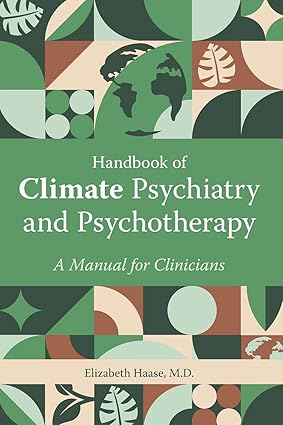 A recently published book by Dr. Beth Haase depicts the growing imortance and concerns for patient mental health linked to climate change .
A recently published book by Dr. Beth Haase depicts the growing imortance and concerns for patient mental health linked to climate change .
This is the interview in Psychology Today from June 2, 2025 ( Reviewed by Jessica Schrader), beteen Dr. Grant Hilary Brenner (GHB) and Dr. Beth Haase (EH)
· GHB: What topics are part of climate psychotherapy and psychiatry?
· EH: You can think of climate psychiatry and psychology as all the factors associated with mental health and well-being that are influenced by climate change. We often break these down into a few large categories. This includes neurobiological effects, like the changes in brain function with high temperature or new or increased neuroinfectious diseases, psychological effects, like grief for losses in the natural world, and ways that climate change is a “threat multiplier” for other unequal social conditions that negatively affect health such as air pollution and urban heat island effects. I also think it is critical to include cognitive science about how people change behaviors and why autocratic and reactionary thinking increases with climate change in order to effect the best response.
· GHB: How do you think about the environment and nature? What is important about the environment and nature for our mental health?
· EH: Nature for me is everything—awe, solace, inspiration, nurturance. I am not alone, though. Many people will tell you their most powerful experiences of stillness, beauty, and wonder occurred in nature. Scientific studies show that time in nature is really good for our immune system, diabetes, hypertension, pulmonary disease, attention and emotional health, among many other benefits. Time in nature decreases loneliness and rumination and improves joy, self esteem, and social connectedness. Interactions with animals help people with anxiety disorders, autism, and health problems. I have a lot of patients who have reduced or eliminated medications after getting an animal.
· GHB: What impacts does climate change have on well-being?
· EH: Climate change impacts all of the lifestyle pillars of good mental health. Haze and heat elicit negative emotions. Good quality food is harder to come by with drought and flooding. Heat, disasters, and changes like sea level rise will increase all kinds of social stress: forced migration, increased civic violence, more exposure to toxins, poor sleep, and so on. Some argue that there will be gains from tourism, outdoor activity, and less cold-related illness from more warm weather, but studies show that these gains are more than offset by negative health and economic effects.
· GHB: How can psychotherapy help folks affected by climate change?
· EH: Most people working in this area feel that group therapy approaches are most empowering for people who are distressed about climate change. It takes a village to tackle these problems. Climate cafes are an easily organized way of gathering people together for a structured conversation about the climate concerns people have and the hurdles they face in themselves and their communities to get to a sustainable way of living. For people who want to go deeper, I recommend the Work that Reconnects and Deep Adaptation Forum, which offer processes for deep value-based reflection, your relationship with the more-than-human world, and what you can connect to and let go of so that your lifestyle comes into better alignment with your climate response. Fossil fuels have given us such an amazing power to live as we wish. But it can feel good to disconnect from constant marketing pulls to do, have, and be more, and we have all the tools to continue our lifestyle through clean energy sources.
· In terms of individual therapy, anyone can benefit from a deeper dive into their own relationship with nature and the existential planetary emergency we are in. In the book, I offer a comprehensive assessment therapists and individuals can do to examine all of the aspects of personal psychology that are relevant to climate change. I also give therapy techniques for experimenting with new kinds of hope, future imagining, and shaking off the disavowal and dialectic extremes that can lead to climate despair.
· It’s also important to remember, though, that almost everyone is concerned about climate change—70-plus percent of the United States population—and so really any conversation about environmental changes and reducing fossil fuel use is going to be helpful. For a lot of people, change feels overwhelming, and just talking with your neighbor can help them and you get over the hurdle, rather than everyone needing formal psychotherapy. I find a 50 percent rule helps my anxiety. You only need to make a 30 to 50 percent change: fly about half as often, or connect up your work and vacation trips. Throw away half as much food and eat half as much meat. Have two children instead of four—that kind of thing.
· GHB: What are some key resources for people who want to learn more about how they can make a difference?
· EH: Al Gore’s Climate Reality Project offers a wonderful free training so anyone can get knowledgeable and figure out how they can use their own unique abilities and interests to make a difference. I also like Bioneers, and for health care professionals, Climate Psychiatry Alliance, Climate Psychology Alliance, and the Medical Societies Consortium for Climate and Health.
Dr. Beth Haase is the author of Handbook for Climate Psychiatry and Psychology: A Manual for Clinicians, and editor of Climate Change and Youth Mental Health. She is a clinical professor of psychiatry at the University of Nevada School of Medicine and medical director of psychiatry at Carson Tahoe Regional Medical Center.
Grant Hilary Brenner, M.D., a psychiatrist and psychoanalyst, helps adults with mood and anxiety conditions, and works on many levels to help unleash their full capacities and live and love well.

